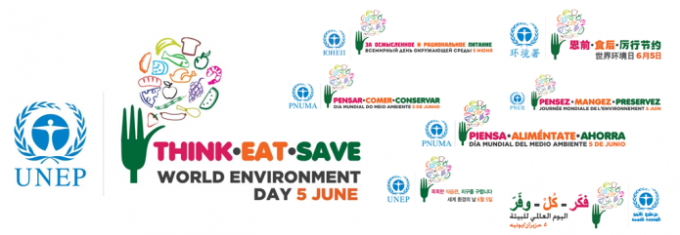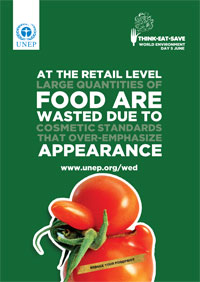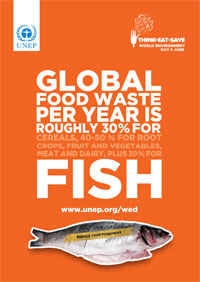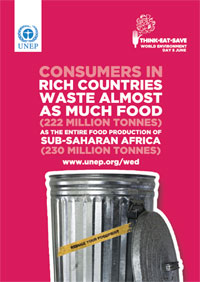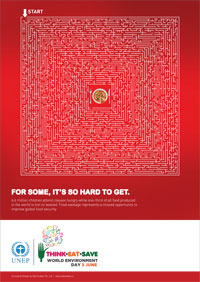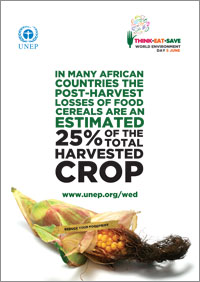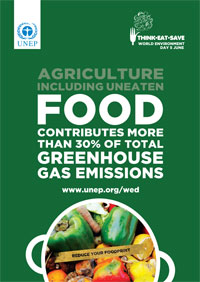It is amazing how we have set up processes creating so much Waste – What were we thinking? Better said – What ARE we thinking! – very little has changed.
On June 5th it is time again to put extra focus on waste – World Environment Day is this year focusing on Food waste.
The number of undernourished people in the world is slowly, very slowly, decreasing from more than 1 Billion people. When I recently (May 30th) checked the number at http://www.worldometers.info/undernourishment/ the counter showed:
900,803,000 undernourished people in the world (!)
Recently there was a large “outcry” regarding falsified meat-declarations, the “horse-meat-scandal”, it made all the headlines and the journalists kept the story rolling for quite some time – at the same time more than 900 million people are fighting hard to get any food at all, while we in the rich parts of the world waste more than 30% or 222,000,000 tonnes of food each year. This reality has a hard time to reach the headlines or our conscience although it goes on during every hour and minute of the year!
“One death is a tragedy. A million is a statistic.”
– Joseph Stalin
It is about time to set the focus right – don’t you agree?!
Engage in World Environment Day!
The UNEP have been promoting this day, June 5th, ever since it was established in 1972.
Events are scheduled all over the world – read more, much more, on UNEP homepage.
There is also a lot of background data and info material, posters, videos etc. available.
Even if you don’t have the opportunity to attend any of the planned events – visit the site, get informed and try to make a difference!
Below are some of the many posters you can download and print from UNEP.
(Click picture to increase – pdf)
UNEP Goodwill Ambassadors Gisele Bündchen and Don Cheadle call on all of us to
‘Think Eat Save: Reduce your Foodprint’ to celebrate World Environment Day 2013.
More videos can be found on http://www.unep.org/wed/infomaterials/videos/
What is going on?
In a recent article in Ensia, Jonathan Foley, summarized the current situation in a good way:
“It never fails. Whenever we talk about meeting the world’s growing demands for food, energy and water, chances are good that we start with ways to produce more of these vital resources. We talk about solar panels, nuclear power stations, GMOs, advanced hydroponics facilities, desalination methods, and other, latest whizbang technologies.”
 On top of this we read about Monsanto’s practices with GMO seeds that not only can hurt the public health; they can also destroy traditional farming methods in communities around the world. Monsanto created the genetically modified organism (GMO) seeds in order to monopolize the seed industry across the world and thus create more revenue.
On top of this we read about Monsanto’s practices with GMO seeds that not only can hurt the public health; they can also destroy traditional farming methods in communities around the world. Monsanto created the genetically modified organism (GMO) seeds in order to monopolize the seed industry across the world and thus create more revenue.
 Recently there were articles and reports on “high acute risk” to honeybees mainly due to a number of common pesticides containing neonicotinoids, and lately the widely used insect nerve agent Fipronil (BASF). Bees and other insects pollinate three-quarters of the world’s food crops but have suffered steep declines due to habitat loss, disease and pesticide use.
Recently there were articles and reports on “high acute risk” to honeybees mainly due to a number of common pesticides containing neonicotinoids, and lately the widely used insect nerve agent Fipronil (BASF). Bees and other insects pollinate three-quarters of the world’s food crops but have suffered steep declines due to habitat loss, disease and pesticide use.
It is the “Drill, baby Drill” within the food industry – infinite growth in a finite environment that seems to be what the multinational food industry is currently “locked” on – again promoted by the corporate executives repeating their “Mantra”:
“…responsibility is to maximise the value that they deliver for their shareholders…”.
We seem obsessed with the need to always deliver more energy, more food and more water, without asking the obvious question: Can we use our existing resources better by becoming more efficient and reducing the huge amount of waste we see today?”
The way forward – Rethink the process…
The estimated population growth from over 7,1 billion today to an expected 9 billion by 2050 (+28%) together with changing diets and with dramatic increases in meat and dairy consumption as much of the world becomes wealthier would result in an assumption that global crop production need to roughly double by 2050, added biofuel consumption not included.
If you to this add the increasing desertification (>30,000 hectars/day), increased loss of land to soil erosion (>18,000 hectars/day), increasing water-scarcity, rising sea-levels, over-fishing in our oceans and changing weather-patterns with more intense droughts and severe flooding – there is now doubt, we are already “pushing” outside the boundaries of what our planet can Sustainably reproduce – and yet close to a billion people is undernourished…
It is high time to “Connect the dot’s”, to base important decisions about the future on “the summary of all available information” instead of the currently “fragmented” way – issue by issue.
If we are going to meet the future need, we need also to work the other way around, starting with our consumption and diets and all the inefficiencies of our food-supply system;
We can simply not afford the current setup
…”regardless if it “brings value to shareholders”…
